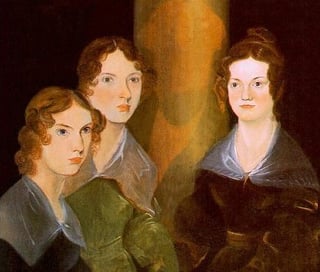Literary societies have been around for hundreds of years. Cornell's Browning Society dates back to 1877. The society, dedicated to the study and promotion of Robert Browning's poetry, led to more widespread popularity of the poet to the point that he acknowledged the society's critical role in his career. Similar societies sprang up, inspired by the Browning group, and today many groups exist for a variety of writers. Some groups focus mostly as social clubs in which hobbyists gather with other like-minded fans to discuss the objects of their literary affection, while others are more scholarly, focusing on discussion, research, and in some cases publication and preservation of texts and estates. The Brontë Society is more like the latter.
 Unlike the Browning Society, the Brontë Society does not study the work on just one writer, but rather the works of all four Brontë siblings, Charlotte, Emily, Anne, and Branwell, writers of Jane Eyre, Wuthering Heights, The Tenant of Wildfell Hall, and a variety of poems, respectively.
Unlike the Browning Society, the Brontë Society does not study the work on just one writer, but rather the works of all four Brontë siblings, Charlotte, Emily, Anne, and Branwell, writers of Jane Eyre, Wuthering Heights, The Tenant of Wildfell Hall, and a variety of poems, respectively.
The Brontë Society was formed in 1893 and its main focus is running the Brontë Parsonage Museum in Haworth in West Yorkshire, the former home of the Brontë siblings.
The museum houses the world's largest collection of Brontë memorabilia from clothing to furniture, and even manuscripts and letters. It is an important site for both Brontë scholars and general fans. The society dedicates itself to the promotion of modern day study of the four writers and hosts festivals, competitions, and other events to that end. The Brontë Society's events and work have become even more important recently as this year marks Charlotte Brontë's bicentennial, with each of her siblings' celebrations following soon after. However, the society's goals have recently been put in jeopardy by a growing disagreement between distinct factions of the society. The dispute recently came to a head during the society's annual meeting in June, prompting numerous mocking headlines about the large argument that took place in the presence of a reporter.
The root of the argument can be traced back two year to a suggestion that the society be reorganized. “Modernisers” proposed that the society be split into two halves, one responsible for the management of the Brontë Parsonage Museum and the business endeavors of the group, while the other half would focus on the literary side. “Traditionalists” argued that things were fine as they were and that the society—at somewhere around fifteen hundred members—was too small to sustain the two separate charities needed to allow two groups to function. The disagreement was so strong that in 2015, the president of the society resigned, along with four other important members of the group. The conflict was reignited this year. New president, actress Dame Judi Dench, was unable to attend the meeting due to filming and stage obligations, but the subject of the resignations was brought up for discussion.
 One member in attendance during this discussion was a reporter for a national newspaper who was clearly in attendance to write an article. Other members took issue with that and called for privacy. A former chairman wanted to speak on her resignation, which she had submitted after only six months, and said she would speak her piece regardless of who was listening and reporting. Members demanded to know what was causing the rash of resignations while other shouting members were told they would have to leave if they did not lower their voices. One woman said the new rules and regulations for the society were so bad that they were beginning to resemble the Stasi of East Berlin.
One member in attendance during this discussion was a reporter for a national newspaper who was clearly in attendance to write an article. Other members took issue with that and called for privacy. A former chairman wanted to speak on her resignation, which she had submitted after only six months, and said she would speak her piece regardless of who was listening and reporting. Members demanded to know what was causing the rash of resignations while other shouting members were told they would have to leave if they did not lower their voices. One woman said the new rules and regulations for the society were so bad that they were beginning to resemble the Stasi of East Berlin.
The uproar was covered by numerous news sources with articles being released in The Guardian, Newsweek, The Daily Mail, and the Evening Standard. Even feminist news website Jezebel weighed in on the events of the meeting, writing an observation piece from the point of view of a distraught and depressed Charlotte Brontë. The Keighley News left all mention of the drama out of their coverage, however, reporting only on the scheduled events of the meeting: a reading of Jane Eyre by actress Maxine White, a report of positive attendance to all Brontë weekend events, the showing of a short film on Charlotte Brontë, and a recent rise in membership.
Certainly the Brontë Society has many things to celebrate. Time will tell if this traditionalists versus modernisers disagreement will continue to plague Emily, Anne, and Branwell's bicentennials in the upcoming years.









